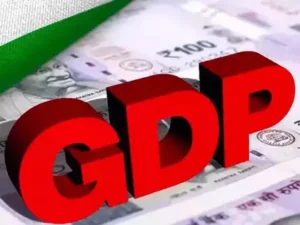What is GDP and how quickly is the UK economy expanding?

Chancellor Rachel Reeves stated that she is “not satisfied” with the numbers for the first three months of the Labour government, although the UK economy hardly expanded between July and September. The economy’s health has an impact on things like worker wage rises and the amount of taxes the government can levy to fund services.
How is GDP calculated and what does it mean?
GDP is a gauge of a nation’s overall economic activity, including that of its businesses, governments, and citizens. Every month, new GDP statistics are released in the UK. On the other hand, quarterly numbers, which span three months at a time, are thought to be more significant.
What’s going on with the economy in the UK?
The first three months of the year saw a robust recovery, with GDP rising by 0.7%. From April to June, external growth was 0.5%.
However, between July and September, it grew very little, and the lackluster growth was attributed to the uncertainties surrounding the October budget. The GDP decreased in September and grew by a meager 0.1% across the three months. Previous predictions have caused disagreement between the UK government and the IMF, and economic forecasts are not always correct.
How do I get affected by GDP?
Because they are earning and spending more, people pay more in taxes while the GDP is growing steadily. This gives the government extra money, which it may use for public services like hospitals, schools, and police.
When a nation enters a recession, these factors may reverse as the economy contracts. When the UK experienced its worst recession in over three centuries in 2020 due to the Covid epidemic, the government was compelled to borrow hundreds of billions of pounds to boost the economy.
Why does the GDP number fluctuate so frequently?
Forty days after the quarter in question, the UK generates one of the fastest estimates of GDP of the major economies. The graphic is updated as new data becomes available because at that point, only roughly 60% of the data is available.
Additional details regarding this are available on the ONS’s external website.
What is the GDP per person?
The standard of living for an individual does not necessarily improve just because GDP is rising. Because more people mean more money being spent, a country’s GDP rises as its population grows. However, it’s possible that people in that nation are not becoming wealthier. On average, they might be becoming poorer even as GDP increases.
The UK economy hardly expands, and budgetary concerns are to blame.

Between July and September, the UK economy increased very little, and the sluggish growth was attributed to uncertainties surrounding the budget. When Labour came to power, increasing economic growth was its top priority. However, Chancellor Rachel Reeves expressed her dissatisfaction with the most recent figures, which only cover the first three months of the new government.
Nonetheless, a lot of companies have criticized the budget’s tax increases, claiming that they will result in greater costs and fewer new jobs. The most recent growth rate was lower than anticipated and represented a significant deceleration from the 0.5% growth observed during the April–June period.
According to several economists, businesses’ and households’ actions were influenced by their worries about the contents of the October budget.
Consistent economic growth encourages individuals to spend more, creates more jobs, raises taxes, and gives workers larger pay increases. In the lead-up to Reeves’ Budget, Andy Crisp, manager of Manchester’s Vapiano pasta and pizza restaurant, reported a modest slowdown.
The week before the Budget, though, he “did see a downturn” in foot traffic. The only explanation for that could be that there seemed to be apprehension before the Budget was released, questioning, “What does it mean to me? What is the public’s interpretation of it?
